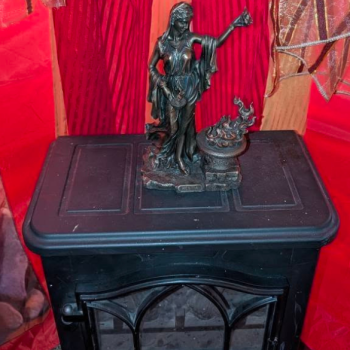Note: This article is part of a special Patheos Symposium, Passing on the Faith: Teaching the Next Generation. Read more perspectives here.
There's a part of me that worries my children might grow up to not have faith. I imagine this is a concern at the top of a lot of lists of people who regularly pour into the lives of kids. Parents, grandparents, mentors, teachers, faith leaders can't help but want the young people in their lives to hold on to this thing that has proven invaluable to our own lives. Still, young people are leaving religion at an alarming rate, and no one seems to know how to stop the bleeding.
Part of my own recurring concern grows out of certain choices my wife, Leslie, and I have made. You see, we've made a conscious decision to limit the amount of religion we pass on to our children. Leslie and I grew up steeped in the church. Our children are not. We ate, slept, and breathed church. We were there two or more days per week—some stretches, every day. Religion also governed who we were away from the church, what we ate, where we went, when we couldn't, why we didn't eat certain things, how we interacted with "non-believers" and who we voted for. Religion was even at the center of our social lives. Religion is typically the means through which we teach faith. So without religion, what are we left with?
We still gather in faith with a community of friends who remind one another of the hopes we share that a better world is possible. We practice with each other what we hope are better ways of being in the world now (as opposed to waiting for a sweet by-and-by), and we direct those energies outward in hope of joining God in making all things new. However, over the years we've noticed that, whenever it came time to speak to our children about the better intuitions we've found, there was always a tendency to reach for the stories and the practices—the myths and the rituals—with which we grew up, exactly the way they were given to us, whether we wanted them on those terms or not. It's infuriating, because these are the same myths and rituals—ways of seeing and being in the world—that almost cost us our faith, and are currently costing other young people theirs.
That is not a statement of judgment. I imagine all people of faith are doing the best they know how by their children. That doesn't mean it's working. And sometimes I fear the path I've chosen isn't much better. It can't be if it leaves my babies to start over from the same place I began.
Not wanting my children to have to retrace the steps I've taken to hold onto faith, I began a few years ago to interrogate the myths and rituals (stories and practices) by which religion was handed to me. What I discovered is that the religion I had was exactly the religion advocated by the stories and practices I rehearsed. It was a religion deeply concerned with remaining in God's favor and securing the reward of heaven at all costs. Sure, no one wants to be in heaven by him or herself, but I reinforced a willingness to sacrifice all if necessary with old-time gospel lyrics like, "If my mother don't go, I'll journey on."
Many friends of mine were smart enough to abandon such poor religion in early adulthood. Sadly, however, absent a more compelling vision for life, some later returned to the same emptiness, once they had gotten too old to party like they used to and began thinking of their children's futures. They likely wouldn't admit it, but many were looking for fire insurance, and I don't blame them.
Notice I speak of the religion passed down, not faith, because the faith I acquired seemed in many ways disconnected from the self-interest of the religion I possessed. My faith was others-interested and spoke of ways of being in the world that had the power to transform it. My faith was about more than just preparation for a Great Escape.
Recognizing these divergent drivers in me made me wonder how such a bifurcation was possible. My religion and my faith were in so many ways incongruent with each other, which got me thinking, "Maybe what I gleaned from the stories and practices that informed my religion weren't the only things in those stories or practices to be gleaned." So perhaps the story of Hagar wasn't just a bump on Abraham's road to becoming iconically faithful or even a hard-learned lesson in not doubting God's promises—both mere sidebars in a faith hero's journey. No, Hagar's story is her own, in part about a misogyny that grows as we tolerate minor insults and abuses directed at women to the point that we don't even recognize sexual slavery and rape when we see it because it's perpetrated by people we admire or against someone with whom we aren't supposed to identify.




